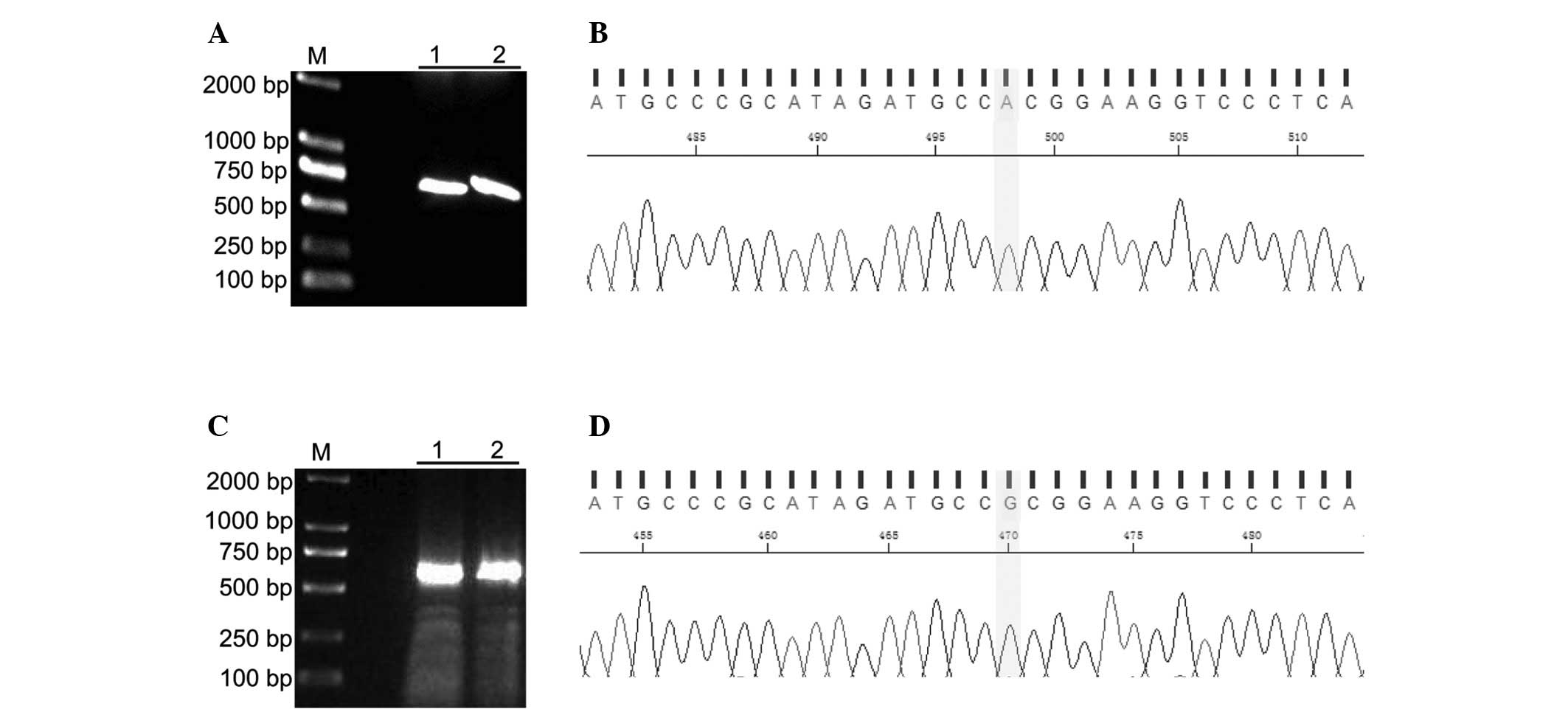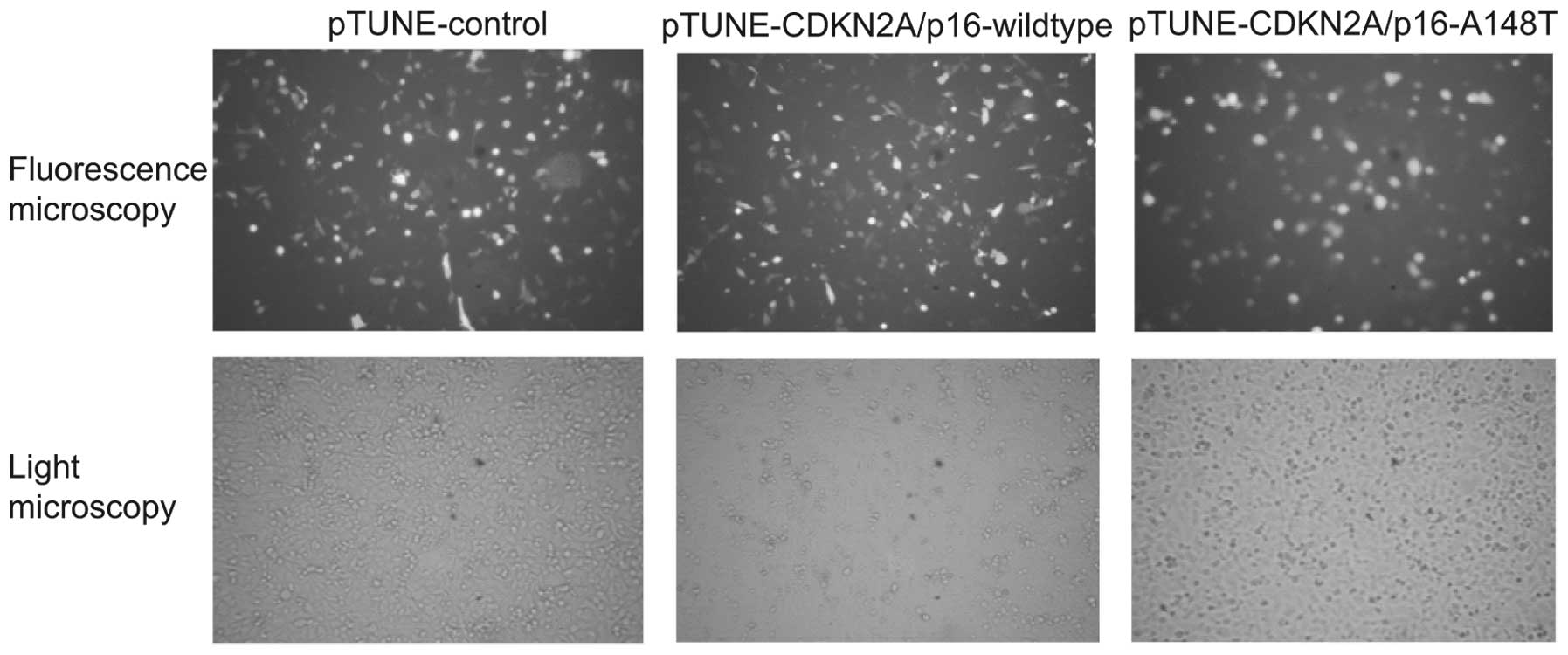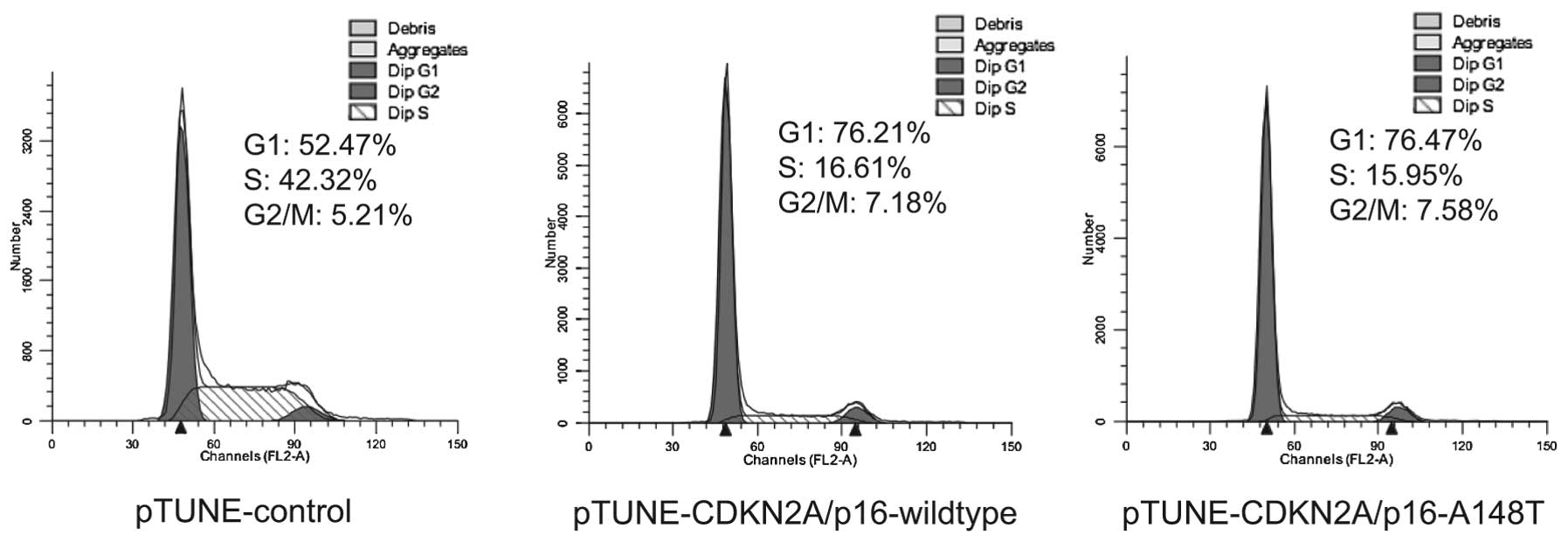|
1
|
Witkiewicz AK, Knudsen KE, Dicker AP and
Knudsen ES: The meaning of p16(ink4a) expression in tumors:
functional significance, clinical associations and future
developments. Cell Cycle. 10:2497–2503. 2011. View Article : Google Scholar
|
|
2
|
Herman JG, Merlo A, Mao L, Lapidus RG,
Issa JP, Davidson NE, Sidransky D and Baylin SB: Inactivation of
the CDKN2/p16/MTS1 gene is frequently associated with aberrant DNA
methylation in all common human cancers. Cancer Res. 55:4525–4530.
1995.PubMed/NCBI
|
|
3
|
Schuyer M, van Staveren IL, Klijn JG, vd
Burg ME, Stoter G, Henzen-Logmans SC, Foekens JA and Berns EM:
Sporadic CDKN2 (MTS1/p16ink4) gene alterations in human ovarian
tumours. Br J Cancer. 74:1069–1073. 1996. View Article : Google Scholar : PubMed/NCBI
|
|
4
|
Rayess H, Wang MB and Srivatsan ES:
Cellular senescence and tumor suppressor gene p16. Int J Cancer.
130:1715–1725. 2012. View Article : Google Scholar : PubMed/NCBI
|
|
5
|
Outwin E, Carpenter G, Bi W, Withers MA,
Lupski JR and O’Driscoll M: Increased RPA1 gene dosage affects
genomic stability potentially contributing to 17p13.3 duplication
syndrome. PLoS Genet. 7:e10022472011. View Article : Google Scholar : PubMed/NCBI
|
|
6
|
Walker F, Zhang HH, Odorizzi A and Burgess
AW: LGR5 is a negative regulator of tumourigenicity, antagonizes
Wnt signalling and regulates cell adhesion in colorectal cancer
cell lines. PLoS One. 6:e227332011. View Article : Google Scholar : PubMed/NCBI
|
|
7
|
Deans TL, Cantor CR and Collins JJ: A
tunable genetic switch based on RNAi and repressor proteins for
regulating gene expression in mammalian cells. Cell. 130:363–372.
2007. View Article : Google Scholar : PubMed/NCBI
|
|
8
|
Schultz DC, Vanderveer L, Buetow KH,
Boente MP, Ozols RF, Hamilton TC and Godwin AK: Characterization of
chromosome 9 in human ovarian neoplasia identifies frequent genetic
imbalance on 9q and rare alterations involving 9p, including CDKN2.
Cancer Res. 55:2150–2157. 1995.
|
|
9
|
Zhang W, Zeng Z, Zhou Y, Xiong W, Fan S,
Xiao L, Huang D, Li Z, Li D, Wu M, Li X, Shen S, Wang R, Cao L,
Tang K and Li G: Identification of aberrant cell cycle regulation
in Epstein-Barr virus-associated nasopharyngeal carcinoma by cDNA
microarray and gene set enrichment analysis. Acta Biochim Biophys
Sin (Shanghai). 41:414–428. 2009. View Article : Google Scholar
|
|
10
|
Romagosa C, Simonetti S, López-Vicente L,
Mazo A, Lleonart ME, Castellvi J and Ramon y Cajal S: p16(Ink4a)
overexpression in cancer: a tumor suppressor gene associated with
senescence and high-grade tumors. Oncogene. 30:2087–2097. 2011.
View Article : Google Scholar : PubMed/NCBI
|
|
11
|
Wolf JK, Kim TE, Fightmaster D, Bodurka D,
Gershenson DM, Mills G and Wharton JT: Growth suppression of human
ovarian cancer cell lines by the introduction of a p16 gene via a
recombinant adenovirus. Gynecol Oncol. 73:27–34. 1999. View Article : Google Scholar : PubMed/NCBI
|
|
12
|
Nagore E, Montoro A, García-Casado Z,
Botella-Estrada R, Insa A, Lluch A, López-Guerrero JA and Guillén
C: Germline mutations in CDKN2A are infrequent in female patients
with melanoma and breast cancer. Melanoma Res. 19:211–214. 2009.
View Article : Google Scholar : PubMed/NCBI
|
|
13
|
Bakos RM, Besch R, Zoratto GG, Godinho JM,
Mazzotti NG, Ruzicka T, Bakos L, Santos SE, Ashton-Prolla P,
Berking C and Giugliani R: The CDKN2A p.A148T variant is associated
with cutaneous melanoma in Southern Brazil. Exp Dermatol.
20:890–893. 2011. View Article : Google Scholar : PubMed/NCBI
|
|
14
|
Spica T, Portela M, Gérard B, Formicone F,
Descamps V, Crickx B, Ollivaud L, Archimbaud A, Dupin N,
Wolkenstein P, Vitoux D, Lebbe C, Saiag P, Basset-Seguin N,
Fargnoli MC, Grandchamp B, Peris K and Soufir N: The A148T variant
of the CDKN2A gene is not associated with melanoma risk in the
French and Italian populations. J Invest Dermatol. 126:1657–1660.
2006. View Article : Google Scholar : PubMed/NCBI
|
|
15
|
Ranade K, Hussussian CJ, Sikorski RS,
Varmus HE, Goldstein AM, Tucker MA, Serrano M, Hannon GJ, Beach D
and Dracopoli NC: Mutations associated with familial melanoma
impair p16INK4 function. Nat Genet. 10:114–116. 1995. View Article : Google Scholar : PubMed/NCBI
|
|
16
|
Lilischkis R, Sarcevic B, Kennedy C,
Warlters A and Sutherland RL: Cancer-associated mis-sense and
deletion mutations impair p16INK4 CDK inhibitory activity. Int J
Cancer. 66:249–254. 1996. View Article : Google Scholar
|

















